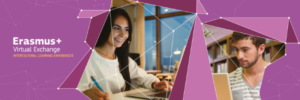- About the Course
- Participants
- Partnership Enquiries
- More about our courses
- Erasmus+ Virtual Exchange
There are 1.8 billion young people in the world today, constituting the largest ever youth population. This generation is building and sustaining peace in vital ways, and their contributions are increasingly being recognized by various sections of society – governments, civil society, and researchers. Along with more recognition, there are now more opportunities than ever for young people to join with peers, take action, and make a real difference as agents of conflict transformation and peacebuilding.
Based on expert content developed jointly by UNOY and Search for Common Ground, in this course you will be introduced to core concepts of violence, conflict, and peace while exchanging ideas and perspectives together with your peers from other countries and diverse cultural backgrounds. Furthermore, you will explore and discuss together the roles you can play in the contexts you live and work in. Is peace possible? What forms does violence take? What is the Youth, Peace and Security agenda? Which tools are used in conflict transformation, and what new collaborations may be possible with the networks you will build in this course?
Dates Apr 13 - May 07 2020
Duration 4 weeks
Language English & Arabic
Application deadline Apr 06 2020
This 4-week course is of specific interest to any young person curious about how to make positive social change or understand more about conflict and peace, whether you are a student, a volunteer, or a young professional. All you need to participate is a computer and internet access. This is a paced-course, and participants are expected to interact and meet weekly exchange requirements alongside their peers. The estimated time commitment is 2.5 to 3 hours per week. An Erasmus+ Virtual Exchange digital badge is given to participants who successfully meet the course requirements.
Participants
This course is open and free of charge to anyone between 18- 30 years old who is a national of or resident in one of the Erasmus+ Virtual Exchange Project countries.
The application deadline for prospective students is April 6 2020.
Partnership Enquiries
Interactive Open Online Courses provide youth with the opportunity to learn both with and from their peers across cultural contexts and national boundaries. The facilitated online meetings are organized around relevant skill-building activities and discussing dynamic content provided by expert academics and practitioners.
If you are interested in offering this course to your students, volunteers in your organisation, or other eligible participants, please contact us. We are happy to offer more information and discuss possible partnership arrangements.
More about our courses
Interactive Open Online Courses provide youth with the opportunity to learn both with and from their peers across cultural contexts and national boundaries in facilitated online meetings alongside relevant skill-building activities and dynamic content provided by expert academics and practitioners. These courses combine the deep impact of intercultural exchange with the broad reach of online learning to allow more young people to have meaningful intercultural learning experiences as part of their formal or non-formal education. Interactive Open Online Courses are part of Erasmus+ Virtual Exchange. This project provides an accessible, ground-breaking way for young people to engage in intercultural learning.
An innovative learning experience
Participants in the interactive courses are provided with the opportunity to:
- Engage with youth from different countries, cultures and backgrounds in a virtual classroom;
- Discuss topical themes on technological innovations, social identity and culture;
- Learn from expert content and materials;
- Improve language and communication skills;
- Build 21st-century skills that improve employability, including the ability to work in a virtual and intercultural environment;
- Gain an Erasmus+ digital badge and become an Erasmus+ Virtual Exchange alumni.
Erasmus+ Virtual Exchange
This Interactive Open Online Course is part of the Erasmus+ Virtual Exchange project and as such produced under a contract with the Education, Audiovisual and Culture Executive Agency, financed by the Union’s budget. The opinions expressed are those of the Sharing Perspectives Foundation, our partners and participants only and do not represent the European Commission’s official position.
© 2020 European Union and EACEA. All rights reserved. Certain parts are licensed under conditions to the EU and EACEA.

Course manual
Here you find essential information about the curriculum, assignments and how to earn your badge.
Check out the course manualResources
Review the weekly videos and content in preparation for your online session here and submit your video-lecture comment.
Check out the resourcesOnline meeting room
Click here to login to the Exchange Portal. Here you will find the meeting room for your weekly group sessions.
Login to your meetingroomAssignments
Video lecture comment
Prior to your online group meeting each week, watch the week’s videos and then respond to at least one lecture with a comment, observation or question.
Reflection Journal
At the end of each online session, you are invited to write 1 paragraph that reflects and records your experience of the day’s session. You will be directed to fill in a short online form answering the themed question of the week. The submission will be acknowledged by the course team but will not be accessible to fellow participants.
Final assignment
In your online groups, you will collectively explore and decide what changes you want to see towards a more peaceful world, and what concrete steps you can take to influence that change. You will decide on collective action in week 3, and before your session in week 4, submit the evidence of your individual action.



